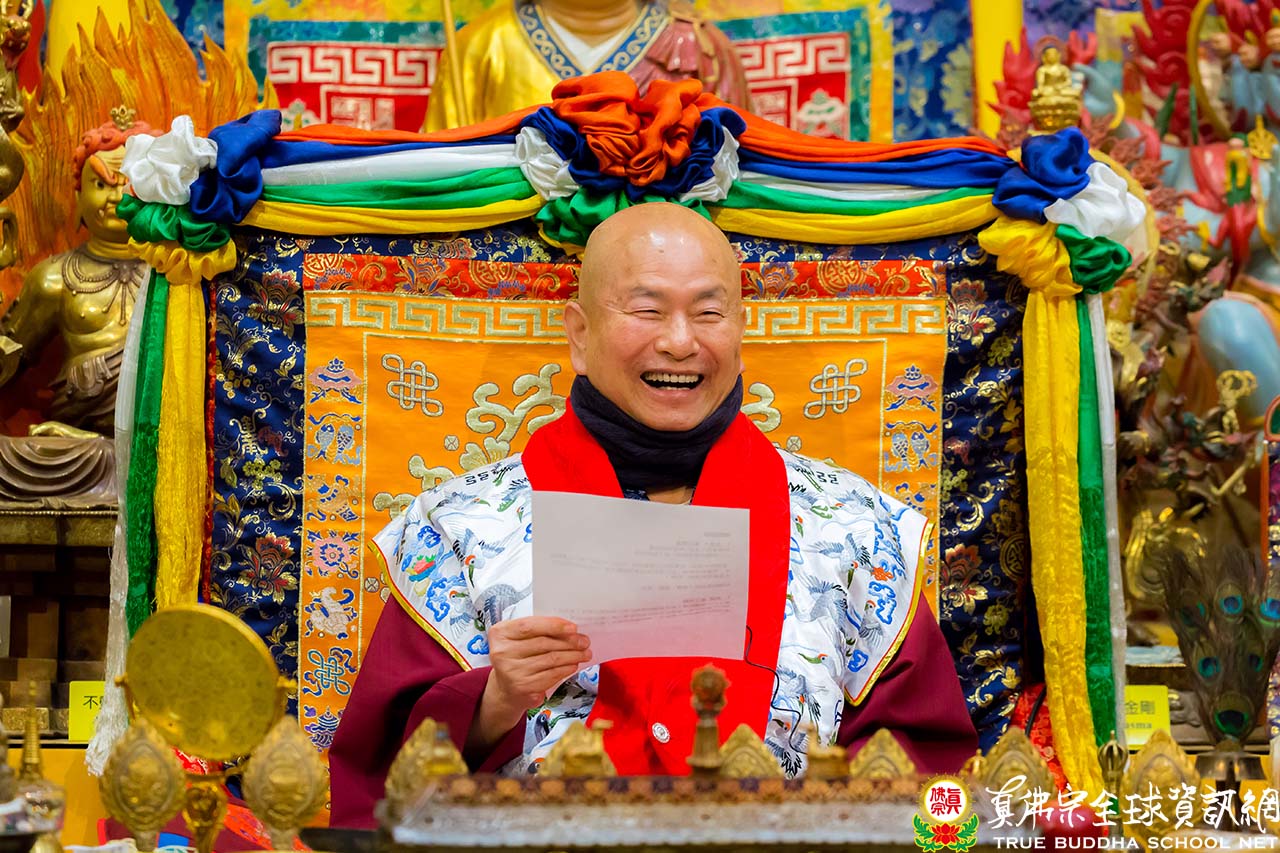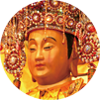
Vajracchedika Prajnaparamita Sutra
Vajra Sutra (Diamond Sutra)
Detailed Exposition by Living Buddha Lian-Sheng, Grandmaster Sheng-Yen Lu
Translated into English by True Buddha School Vajra Sutra Translation Team
Ten—Magnificent[1]Pureland
The Buddha asked Subhuti, “What do you think? Did the Tathagata obtain anything from the dharma at Dipamkara Buddha’s place?”
Subhuti replied, “No, World-honored One. When the Tathagata was with Dipamkara Buddha, he did not obtain anything from the dharma.”
“Subhuti, what doyou think? Do the bodhisattvas adorn the buddhaland?”
Subhuti replied, “No, World-honored One. Why? Because adorning is not adorning; it is[merely] called adorning.[2]
“That is so, Subhuti. All bodhisattvas and mahasattvas should generate this pure mind, they should not give rise to the mind which dwells on forms, nor on sound, smell, taste, touch, nor anything at all. They should instead give rise to the mind which does not dwell on anything.
“Subhuti, if someone has a body as big as Mount Meru, is his body big? What do you think?”
Subhuti replied,“Very big indeed, World-honored One. Why? Because the Buddha says that [only a]non-body is called a big body.”
Now, we will expound the Vajra Sutra’s Chapter Ten—Magnificent Pureland. What is a pureland? Amitabha Buddha’s pureland, Sukhavati—the Western Realm of Utmost Bliss—is a pureland most frequently mentioned. However, there are many other purelands like Ksitigarbha Bodhisattva’s Jade Green Profound Pureland, Avalokitesvara’s World of Omnipresence, Medicine Buddha’s Lapis Lazuli Pureland, and more. A pureland is a completely pure place, the abode of the sages where there is only bliss and absolutely no suffering. In a pureland, there are dharmakaya buddhas, sambhogakaya buddhas, and nirmanakaya buddhas.
In the Sukhavati pureland, there are four levels. The Mixed Pureland Where Sages Live with Mundane Beings is the lowest level of Sukhavati, where sentient beings with remaining karma could be reborn into. Here, [it is much easier for the mundane beings to continue eradicating their karma as] mundane beings will be greatly influenced by the sages and eventually rise to a higher realm and become sages themselves.
The second level of Sukhavati is The Abundant Pureland for Convenience, a pureland for nirmanakaya buddhas. The third level is the Magnificent Pureland of Real Rewards, where the sambhogakaya buddhas are. And its highest level is the Pureland of Eternal Serene Light, where the dharmakaya buddhas are.
Hence, the dharmakaya buddhas, the sambhogakaya buddhas, and the nirmanakaya buddhas are all in the purelands. In addition, sages also stay in the purelands. What is meant by magnificent? It means it is utterly pure. Purity is magnificent.
Now, we will talk about Chapter Ten. The Buddha asked Subhuti, “What do you think? Did the Tathagata obtain anything from the dharma at Dipamkara Buddha’s place?” Subhuti replied, “No, World-honored One. When the Tathagata was with Dipamkara Buddha, he did not obtain anything from the dharma.”
Let me expound on the statement, “When the Tathagata was with Dipamkara Buddha, he did not obtain anything from the dharma.” In one of Sakyamuni Buddha’s past lives in which he was called Sumeda, he took the lotus blossoms given to him by Yasodhara [named Sumita in that previous lifetime] and offered them to Dipamkara Buddha.
Did he obtain anything at Dipamkara Buddha’s place? Subhuti replied, “No, World-honored One. When the Tathagata was with Dipamkara Buddha, he did not obtain anything from the dharma.” In other words, when Sakyamuni Buddha went to Dipamkara Buddha’s place, did he learn anything? Subhuti replied that he actually learned nothing.
He gained nothing! Who can give a complete explanation on this “nothing to gain”? Why is there nothing to gain? If you can answer it to my satisfaction… [Grandmaster takes a prayer bracelet and blows his breath on it]. If you can explain “nothing to gain” perfectly, you will “gain” this prayer bracelet. [chuckles] Everybody can chant the Vajra Sutra, and it is chanted during bardo or any ceremony. Think, why is it when Sakyamuni Buddha met Dipamkara Buddha, he did not gain anything? Did Dipamkara Buddha not teach anything? [Someone tries to answer but fails.]
Let me tell you then, for this is very significant. If you cannot explain it clearly, it means that you have not sufficiently understood it. In the period following the Six Patriarch [of Zen Buddhism], the Vajra Sutra has been used to determine if one has gained enlightenment or not. One has gained enlightenment if one complies with the Vajra Sutra, and vice versa.
Why did Sakyamuni Buddha say that there is nothing to gain? All sages never gain anything. If they ever gained anything from any guru anywhere, it would not count since that is not a true gain. A real gain is on unattainability [the understanding that everything is unattainable and that there is nothing to gain].
Upon enlightenment, Sakyamuni Buddha said this one [key] statement: “All beings in the world have buddhanature.” Since you intrinsically embody buddhanature, you will always have it in you. Why do you need to gain buddhanature? Buddhanature is not to be gained and it is impossible to gain buddhanature.
Are you talking about obtaining the light of Dipamkara Buddha [Dipamkara literally means To Set The Light]? Or did he ignite the light of your heart? No! Buddhanature is already within the mind of each sentient being. [Recall,] The Records of Pointing to the Moon, which spoke of similes analogous to a finger pointing to the moon to show that buddhanature has been there all along. [The finger is analogous to the enlightening teaching, and the moon represents buddhanature.]
You already have it in you, so there is no need to ask for it from anyone. Nothing to ask, that is correct! You must realize your own buddhanature. Even Dipamkara Buddha cannot give you anything, therefore, there is nothing to gain.
Pay attention to this meaning, it is of great importance. Why did Sakyamuni Buddha not gain anything at Dipamkara Buddha’s place? Because he already had it within him. There was nothing more to gain. This is referred to as “nothing to gain.” Only Subhuti was capable to say, “No, World-honored One. When the Tathagata was with Dipamkara Buddha, he did not obtain anything from the dharma.”
[This talks about] our intrinsic inner state, which is within us all along. [Buddhanature] is intrinsically within us, buddhahood is also our very own. You can neither ask for buddhahood from Dipamkara Buddha, nor is it something that Grandmaster can give to you. In the future, if you attain buddhahood, it is you who attains buddhahood. It is your own; it is not something to be given.
What can be given are mundane things, like prayer bracelets or vajra scepters. Saying, “At Dipamkara Buddha’s place I got a vajra scepter, so I got something” does not mean you gained anything because those are just mundane things. The only real thing is buddhanature, and you have never been without it. So what else is there to gain, right?
Hence, when you recite the Vajra Sutra, you should comprehend its meaning. Everybody can chant or even memorize it. Some chant it daily or frequently, yet they do not understand its essential meaning.
Today, this statement is the key point: there really is nothing to gain. “No, World-honored One. When the Tathagata was with Dipamkara Buddha, he did not gain anything from the dharma.” Subhuti knew it. Yet had I not known it and explained, you will never understand the real meaning of this statement. All you know is just the words “nothing to gain.” The Heart Sutra states, “Because there is nothing to gain, you are a bodhisattva.” You can become a bodhisattva because [you comprehend that] there is nothing to gain.
Whether we are reciting sutras or practicing buddhadharma, we need to understand its meanings. Most gurus in their explanation would just talk about the words or their literal meaning. Like just now, Lian Xu [who tried to answer earlier] said, “The mind of the past is unattainable, the mind of the present is unattainable, and the mind of the future is unattainable.” Nothing is attainable. Most of them would only speak as such. They do not know the real reason why Sakyamuni Buddha did not gain anything after he left Dipamkara Buddha.
There was a zen patriarch who went to train with a guru. When he returned, people asked him what he had gained from his guru. He replied, “I finally got…” “What did you get?” He answered, “I finally knew...” “What did you know?” “I know that the eyes are horizontal and the nose is vertical.” Everybody knows that, right? By stating the obvious—that the eyes are horizontal and the nose is vertical—he implied that he did not gain anything.
It is you yourself who attain buddhahood! Buddhahood is not to be given by your guru. Grandmaster only points to the moon. My finger points to the moon, and you would see the moon. This is how it is.
Sakyamuni Buddha’s teachings [buddhadharma] is full of the unsurpassed supreme wisdom. The Vajra Sutra itself contains such supreme wisdom of the Tathagata. This wisdom is not something that an ordinary being can fathom. The Vajra Sutra is a condensed MahaprajnaparamitaSutra, and the Heart Sutra is the condensed Vajra Sutra. [All these three sutras] contain the wisdom of the Tathagata and the quintessence is in the Heart Sutra and the Vajra Sutra. The Heart Sutra is the shortest, and most people can chant and even memorize it.
If you are truly enlightened, you can immediately understand every sutra you read. If you have not gained enlightenment, then you find any sutra a hindrance. Memorizing or the daily chanting of the Heart Sutra or the Vajra Sutra is not as meaningful as [its clear understanding]. [For instance,] the Sixth Patriarch [Huineng] was immediately enlightened upon hearing the statement, “The mind should arise without dwelling on anything.” Imagine that, only one statement!
“No, World-honored One. When the Tathagata was with Dipamkara Buddha, he did not obtain anything from the dharma.” This statement is the key point today. It [buddhanature] is already in you! And it cannot possibly be obtained. Therefore, there is nothing to gain!
Om mani padme hum.
[1] Vyuha was translated to Chinese as 莊嚴, which has been translated to English as dignified. Vyuha means magnificence, splendor, adornment as well as supernatural qualities. Here we chose to translate 莊嚴 as magnificent.
[2] Translator’s Note: This phrase means that the buddhaland is magnificent as is, the bodhisattvas are magnificent as they are and the buddhas too are magnificent as they are. It does not matter if they are adorning or not, they are all magnificent. Magnificent is just a term or name, and all names are created for a convenience, but even then, it may not be so fixated. Once the purpose is served, there is no longer any meaning to the name. In other words, there is no adorning in the buddhaland [as everything is magnificent as is]. Adorning is [merely] a name.
Next discourse on the Vajra Sutra: Discourse 29, 31 October 2021 - Chapter Ten—Magnificent Pureland (continued)
Previous discourse on the Vajra Sutra: Discourse 27, 24 October 2021 - Chapter Nine—Phenomena is Non-Phenomena (continued)
Index of links to all discourse on the Vajra Sutra: https://en.tbsn.org/guidem/detail/2265/
Back to the main index page of all dharma discourse: https://en.tbsn.org/guidem/index
Full webcast of 2021.10.30 Padmakumara Group Practice (Ling Shen Ching Tze Temple, Redmond, USA) and dharma discourse with English interpretation: https://youtu.be/z1PfUUaicWY




